Our Church
The Church’s Origin
Our members are Christians. The Bible teaches that the early disciples of Jesus were called Christians first at the church in Antioch (Acts 11:26)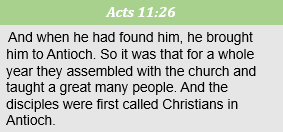 . When one hears the word of God and obeys in baptism, the Lord adds him to His church (Acts 2:47)
. When one hears the word of God and obeys in baptism, the Lord adds him to His church (Acts 2:47) . Then it is the responsibility of that new Christian to join themselves to a local body of believers for mutual edification and accountability
. Then it is the responsibility of that new Christian to join themselves to a local body of believers for mutual edification and accountability
(Acts 9:26; I Cor. 12:27;
I Cor. 12:27; Heb. 10:24-25)
Heb. 10:24-25)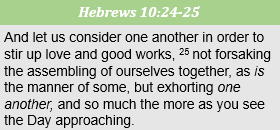 .
.
The Church’s Organization
The church of Christ is not a denomination, nor is it many denominations under one head. The church of Christ is Christ’s body (Eph. 1:22-23;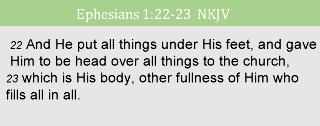 Col. 1:18-19
Col. 1:18-19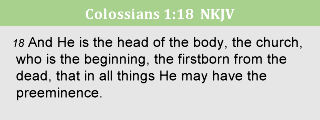 ). Just as Christ has but one body, so it is with His church–there is one church. I’m not afraid to say that because that’s what the Bible says–there is one body (Eph. 4:4)
). Just as Christ has but one body, so it is with His church–there is one church. I’m not afraid to say that because that’s what the Bible says–there is one body (Eph. 4:4) and the body is the church (Col. 1:18)
and the body is the church (Col. 1:18) ; so there’s just one church. That’s not so hard to see when you understand that the church is the saved (Acts 2:47)
; so there’s just one church. That’s not so hard to see when you understand that the church is the saved (Acts 2:47) and there’s only one group of the saved.
and there’s only one group of the saved.
The Church’s Creed
The church has only one system of belief-one gospel. The gospel is the teachings of Jesus Christ, his apostles and prophets (Rom. 15:4;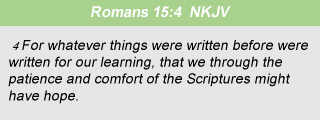 Matt. 28:18-20;)
Matt. 28:18-20;)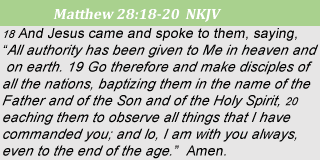 Those teachings are the foundation on which a man’s obedience is based–and by the approval of Christ Himself (John 12:48)
Those teachings are the foundation on which a man’s obedience is based–and by the approval of Christ Himself (John 12:48) . Any other gospel is forbidden. There is no reason for adding or taking from the word of God.It does all that God wants done, when and how He prescribes, and by whom. To add some “discipline,” “catechism,” or “creed” to it is to change its form and substance and make it what God didn’t intend. Just as it’s possible to take a blueprint, recipe, or schematic and build something according to it, the Bible is the blueprint, the recipe and the schematic for the church. It will produce the same thing, generation after generation, no matter the time or culture. It’s God’s plan. It works.(Gal.1:6-9;
. Any other gospel is forbidden. There is no reason for adding or taking from the word of God.It does all that God wants done, when and how He prescribes, and by whom. To add some “discipline,” “catechism,” or “creed” to it is to change its form and substance and make it what God didn’t intend. Just as it’s possible to take a blueprint, recipe, or schematic and build something according to it, the Bible is the blueprint, the recipe and the schematic for the church. It will produce the same thing, generation after generation, no matter the time or culture. It’s God’s plan. It works.(Gal.1:6-9;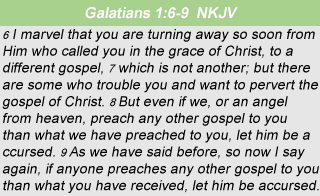 Jude 3;
Jude 3; 2 John 2:9).
2 John 2:9).
The Church’s Law of Pardon
The New Testament church–the church of Christ–offered only one law of pardon, one way for salvation, and that’s Christ’s way. Jesus said, “I am the way, the truth, and the life; no man cometh to the Father but by me” (Jn. 14:6) . That’s the way it is. It’s His way or no way. His law of pardon is found in terms set forth in the gospel–the ones we mentioned above. They cannot be changed, now matter what, and they are just as applicable now as when they were first established. No matter how culture and society have changed, the gospel doesn’t change because Jesus Christ doesn’t change (Heb. 13:8)
. That’s the way it is. It’s His way or no way. His law of pardon is found in terms set forth in the gospel–the ones we mentioned above. They cannot be changed, now matter what, and they are just as applicable now as when they were first established. No matter how culture and society have changed, the gospel doesn’t change because Jesus Christ doesn’t change (Heb. 13:8) . It will be the same 1,000 years from now, should time remain. The law of pardon is not the Bible plus a catechism, nor the Bible plus a creed, or the Bible plus a disciple, nor any other man-made document. It is not the Bible plus anything. It’s the Bible, and that’s all.
. It will be the same 1,000 years from now, should time remain. The law of pardon is not the Bible plus a catechism, nor the Bible plus a creed, or the Bible plus a disciple, nor any other man-made document. It is not the Bible plus anything. It’s the Bible, and that’s all.
The Church’s Work and Worship
When the Bible says a thing, that’s the end of the matter. It is the complete authority, the “mind of Christ” (1 Cor. 2:16) . When it doesn’t say a thing, that thing does not have the “mind of Christ” to approve it. God made known what He wants. For instance, when the Bible says that we are to sing praises to God (Eph. 5:19, etc.)
. When it doesn’t say a thing, that thing does not have the “mind of Christ” to approve it. God made known what He wants. For instance, when the Bible says that we are to sing praises to God (Eph. 5:19, etc.) and it says nothing at all about playing anything other than the instrument of the heart, that’s what it means. No long explanation is needed to explain the silence of the scriptures. We use that logic everyday: When one thing is called for, we need not cite a hundred or more things that are not.
and it says nothing at all about playing anything other than the instrument of the heart, that’s what it means. No long explanation is needed to explain the silence of the scriptures. We use that logic everyday: When one thing is called for, we need not cite a hundred or more things that are not.
It’s a Serious Matter
It’s a serious matter to try to make God’s church into something He never intended, no matter the motivation. He is not pleased with sacrifices that are not authorized (Gen. 4:1-9;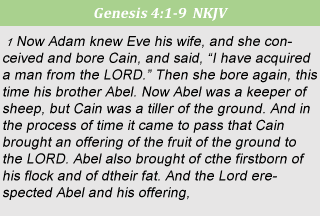 Lev. 10:1-3).
Lev. 10:1-3).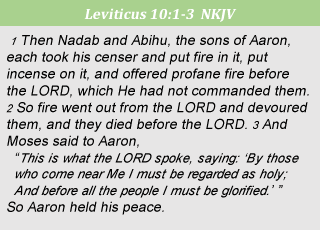 We dare not tamper with God’s plan unless we construct something He didn’t authorize, and put our faith in something less than He planned and approved. And that’s what we are all about here at Memorial Parkway. We are trying to be the church that Jesus Christ built and died for (Matt 16:18;
We dare not tamper with God’s plan unless we construct something He didn’t authorize, and put our faith in something less than He planned and approved. And that’s what we are all about here at Memorial Parkway. We are trying to be the church that Jesus Christ built and died for (Matt 16:18;
Acts 20:28, Eph. 5:23-25).
Eph. 5:23-25).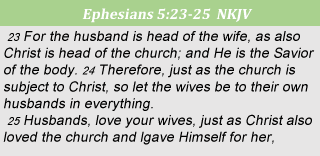 Won’t you come and join us?
Won’t you come and join us?
Our Elders
What the Bible Says about Elders
“And when they had ordained them elders in every church, and had prayed with fasting, they commended them to the Lord, on whomthey believed.” (Acts 14:23) Our elders arethe answer to the New Testament’s command for organization in the local church. The elders are a plurality of men that lead, watch and feed spiritually our local group of God’s people according to God’s word. These men are selected from among our group that have met certain qualifications that have been laid out by God in (Titus 1:5-9) and
Our elders arethe answer to the New Testament’s command for organization in the local church. The elders are a plurality of men that lead, watch and feed spiritually our local group of God’s people according to God’s word. These men are selected from among our group that have met certain qualifications that have been laid out by God in (Titus 1:5-9) and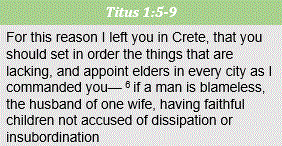 (I Timothy 3:1-9)
(I Timothy 3:1-9)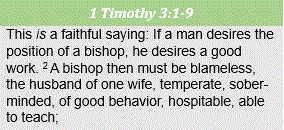 . The Greek word translated elders is presbyter-which means “older in age. “This shows that those that are selected for this work are men that, due to their age and experience, have the wisdom and qualifications to lead a local church. (Acts 14:23).
. The Greek word translated elders is presbyter-which means “older in age. “This shows that those that are selected for this work are men that, due to their age and experience, have the wisdom and qualifications to lead a local church. (Acts 14:23). Every local church was to have elders as referenced in the scripture.
Every local church was to have elders as referenced in the scripture.
These same men are called Bishops in the New Testament
In (Philippians 1:1) we have the entire organization of the local body of Christ when Paul wrote, “Paul and Timotheus, the servants of Jesus Christ, to all the saints in Christ Jesus which are at Philippi, with the bishops and deacons.” The Greek word for bishop is “episcopos” which means “one that superintends or oversees another.” This speaks to the work of these men. Paul commanded the elders of the church at Ephesus in (Acts 20:28)
we have the entire organization of the local body of Christ when Paul wrote, “Paul and Timotheus, the servants of Jesus Christ, to all the saints in Christ Jesus which are at Philippi, with the bishops and deacons.” The Greek word for bishop is “episcopos” which means “one that superintends or oversees another.” This speaks to the work of these men. Paul commanded the elders of the church at Ephesus in (Acts 20:28) “Take heed therefore unto yourselves, and to all the flock, over which the Holy Ghost hath made your overseers (bishops),…” Our elders oversee the work here at Memorial Parkway and guide us according to the sciptures.
“Take heed therefore unto yourselves, and to all the flock, over which the Holy Ghost hath made your overseers (bishops),…” Our elders oversee the work here at Memorial Parkway and guide us according to the sciptures.
These men are also called Pastors
Once again, note what Paul said in (Acts 20:28) “Take heed therefore unto yourselves, and to all the flock, over the which the Holy Ghost hath made you overseers, to feed the church of God…” The root word of feed in this verse is “poimen”, which means “A Shepherd or one who tends a flock.” This is where we get the English word pastor. Another time this phrase is used is in (Eph. 4:11)
“Take heed therefore unto yourselves, and to all the flock, over the which the Holy Ghost hath made you overseers, to feed the church of God…” The root word of feed in this verse is “poimen”, which means “A Shepherd or one who tends a flock.” This is where we get the English word pastor. Another time this phrase is used is in (Eph. 4:11)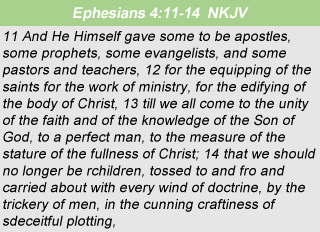 “And he gave some, apostles; and some, prophets; and some, evangelists; and some, pastors (poimen) and teachers;”
“And he gave some, apostles; and some, prophets; and some, evangelists; and some, pastors (poimen) and teachers;”
Once again, note there is not a pastor, but pastors – plural
A pastor can be a preacher, but a preacher is not necessarily a pastor. A pastor is a bishop and an elder. These are three different terms that refer to the same men with the same office. The different designations simply refer to different aspects of their duties. They are older men (elders) that oversee the work of the church (bishops) that lead, protect and feed (pastor) the local flock of God’s people.
The Apostle Peter uses all three of these terms to describe these same men in (I Peter. 5:1-4) “The elders (presbyters) which are among you I exhort, who am also an elder, and a witness of the sufferings of Christ, and also a partaker of the glory that shall be revealed: Feed (poimen) the flock of God which is among you, taking the oversight(episcopos) thereof, not by constraint, but willingly; not for filthy lucre, but of a ready mind; Neither as being lords over God’s heritage, but being ensamples to the flock. And when the chief Shepherd (poimen) shall appear, ye shall receive a crown of glory that fadeth not away.”
“The elders (presbyters) which are among you I exhort, who am also an elder, and a witness of the sufferings of Christ, and also a partaker of the glory that shall be revealed: Feed (poimen) the flock of God which is among you, taking the oversight(episcopos) thereof, not by constraint, but willingly; not for filthy lucre, but of a ready mind; Neither as being lords over God’s heritage, but being ensamples to the flock. And when the chief Shepherd (poimen) shall appear, ye shall receive a crown of glory that fadeth not away.”
Therefore, the elders at Memorial Parkway Church of Christ are a plurality of men that have met the qualifications to become such leaders of our local body according to scripture that lead, feed, and oversee the work commanded for us to do (Eph. 1:22-23; Col. 1:18)
Col. 1:18) according to our Head Jesus Christ.
according to our Head Jesus Christ.
Our Deacons
What the Bible Says about Deacons
(Philippians 1:1) “Paul and Timotheus the Servant of Jesus Christ, to the saints in Christ Jesus in Philippi with the bishops and deacons.”
“Paul and Timotheus the Servant of Jesus Christ, to the saints in Christ Jesus in Philippi with the bishops and deacons.”
Like our elders, our deacons are an answer to the Bible’s teaching on the organization of the local church. The word deacon is from the Greek word “diakonos”, which means “one who executes the commands of another, especially as a servant with a master”. Although one might rightly say that all Christians are called to be servants (Mark 10:43-44) , this office is a special servant to the local church. Paul says in
, this office is a special servant to the local church. Paul says in
(I Tim. 3:13) “For they that have used the office of a deacon well purchase to themselves a good degree, and great boldness in the faith which is in Christ Jesus.” Like
“For they that have used the office of a deacon well purchase to themselves a good degree, and great boldness in the faith which is in Christ Jesus.” Like
the eldership, this is a special position in the local church that is held by men with specific
qualifications and experiences.
In (I Tim. 3:8-13) , Paul outlines for the local church exactly what kind of men that are to be appointed to this work. After careful examination of these men’s lives and their families, as compared to these instructions, an eldership will select these men from among our number to take on their responsibilities.
, Paul outlines for the local church exactly what kind of men that are to be appointed to this work. After careful examination of these men’s lives and their families, as compared to these instructions, an eldership will select these men from among our number to take on their responsibilities.
The works of the deacons are numerous and are under the direct supervision and guidance of our elders. They aide the elders with their work especially regarding physical things, so that the elders may attend to the spiritual matters of the congregation.
Our Evangelist
Our Preacher
(Eph. 4:11) “And He Himself gave some to be apostles, some prophets, some evangelists, and some pastors and teachers,”
“And He Himself gave some to be apostles, some prophets, some evangelists, and some pastors and teachers,”
The word evangelist comes from the Greek word “evangelistes”, which means “one who sounds forth good things, or good teachings.” The evangelist is the one that preaches and teaches God’s word. Although any male Christian can preach or teach publicly, there are men that have dedicated their lives to the Lord’s service in preaching God’s word. (I Cor. 6:9-14;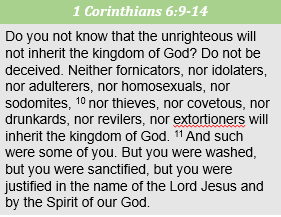 Phil. 4:15-18)
Phil. 4:15-18)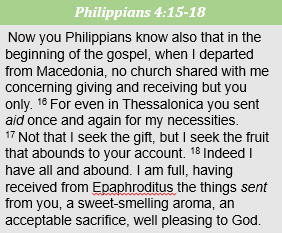 As laborers in God’s vineyard they are worthy of their wages that they receive from local congregations that help support them and their families in their efforts.
As laborers in God’s vineyard they are worthy of their wages that they receive from local congregations that help support them and their families in their efforts.
The preacher, or evangelist, is not an employee of the church, but a servant of the Lord. However, he does serve at the good pleasure and under the direction of the eldership of any local congregation. He is enjoined to preach only God’s word and not the opinion or conventions of men (I Peter 4:11)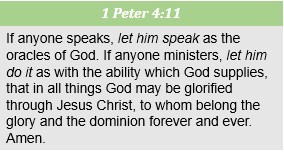 . Therefore, you will find that our preacher will provide book, chapter and verse for everything that he preaches so that we all know that the things that he is preaching is coming from the Bible, the Word of God.
. Therefore, you will find that our preacher will provide book, chapter and verse for everything that he preaches so that we all know that the things that he is preaching is coming from the Bible, the Word of God.
The preacher holds an important role in the salvation of souls, as Paul said in (Rom. 10:13-15)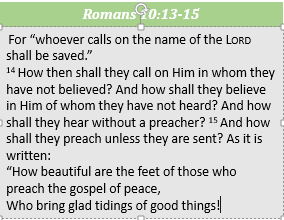 “For whosoever shall call upon the name of the Lord shall be saved. How then shall they call on him in whom they have not believed? And how shall they believe in him of whom they have not heard? And how shall they hear without a preacher? And how shall they preach, except they be sent?” As it is written, “How beautiful are the feet of them that preach the gospel of peace, and bring glad tidings of good things!”
“For whosoever shall call upon the name of the Lord shall be saved. How then shall they call on him in whom they have not believed? And how shall they believe in him of whom they have not heard? And how shall they hear without a preacher? And how shall they preach, except they be sent?” As it is written, “How beautiful are the feet of them that preach the gospel of peace, and bring glad tidings of good things!”
Our Members
Our Members
The Bible describes the Christian in many different ways. We are the sheep of his sheepfold
(John 10:11-15)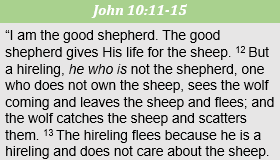 , the children in His family (Eph. 1:4-5)
, the children in His family (Eph. 1:4-5)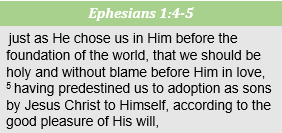 , the branches in His Vine (John 15:5)
, the branches in His Vine (John 15:5) , the soldiers in His Army (Eph. 6:11-17)
, the soldiers in His Army (Eph. 6:11-17)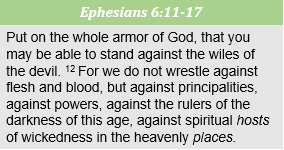 , and citizens in His kingdom (Eph 2:19;
, and citizens in His kingdom (Eph 2:19;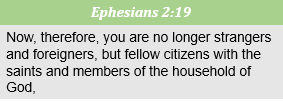 Col. 1:13)
Col. 1:13) . All of these terms speak to belonging. We, as human beings, were created for community. Even in Eden the only thing that God said that was not good was man being alone (Gen. 2:18)
. All of these terms speak to belonging. We, as human beings, were created for community. Even in Eden the only thing that God said that was not good was man being alone (Gen. 2:18) .
.
It was conceived in the mind of God (Eph. 3:10-11)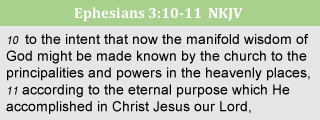 , founded by Christ, promised by Him (Mathew
, founded by Christ, promised by Him (Mathew 
16:18) and built by Him.(Acts 2:41-47) . It was not conceived by man, nor could it have been
. It was not conceived by man, nor could it have been
(1 Cor. 2:9)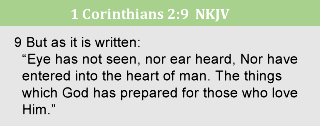 and it was not built on man, nor on his ideas and concepts (Eph. 2:
and it was not built on man, nor on his ideas and concepts (Eph. 2: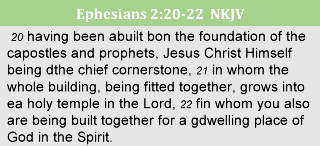 20-22). Christ is its foundation (1 Cor. 3:11)
20-22). Christ is its foundation (1 Cor. 3:11) , and there is no other~not Mohamed, not Budda, not Martin Luther, not even John the Baptist or Peter, the Apostle. It’s Christ’s church, the church of Christ.
, and there is no other~not Mohamed, not Budda, not Martin Luther, not even John the Baptist or Peter, the Apostle. It’s Christ’s church, the church of Christ.
As Christians, we were made to be members in the same body. Paul said in (Romans 12:4-5)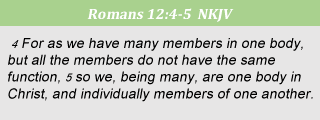 “For as we have many members in one body, and all members have not the same office: So we, being many, are one body in Christ, and every one members one of another.” And again in (I Cor. 12:27)
“For as we have many members in one body, and all members have not the same office: So we, being many, are one body in Christ, and every one members one of another.” And again in (I Cor. 12:27) “Now ye are the body of Christ, and members in particular.”
“Now ye are the body of Christ, and members in particular.”
Therefore we are a local body of Jesus Christ, each member a part of the whole working together at the direction of our head, Jesus Christ (I Cor. 12:12-27)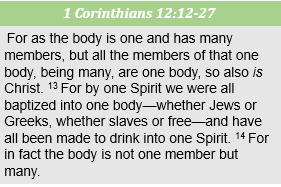 . We come together to worship and study God’s word, and throughout the week, we encourage one another as we live our lives (Heb 3:13)
. We come together to worship and study God’s word, and throughout the week, we encourage one another as we live our lives (Heb 3:13) .
.
As members of the body we are thus accountable to one another because we need each other to do their part so that the body functions properly (I Cor. 12:12-27) . We work together in our local area under the direction of our eldership (Acts 14:23)
. We work together in our local area under the direction of our eldership (Acts 14:23) , and they lead, feed and admonish us in the ways of the Lord (Acts 20:28;
, and they lead, feed and admonish us in the ways of the Lord (Acts 20:28; I Pet. 5:1-3;
I Pet. 5:1-3;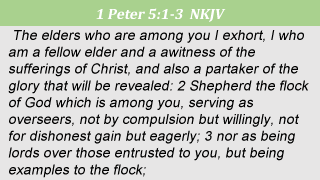 Heb 13:17)
Heb 13:17)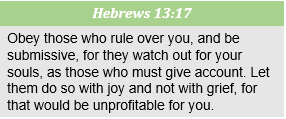 .
.